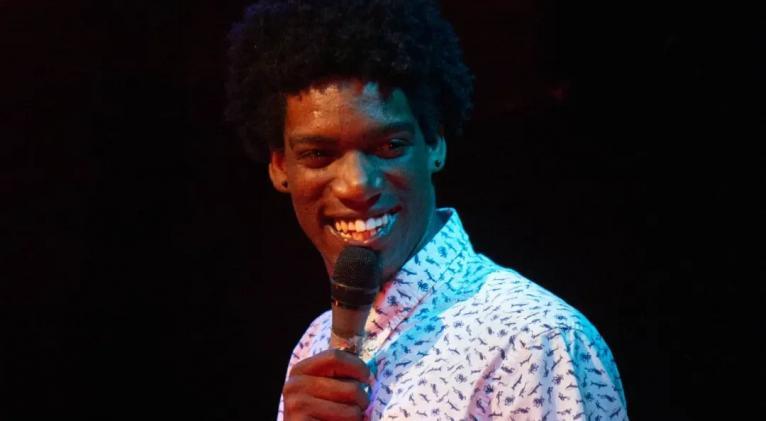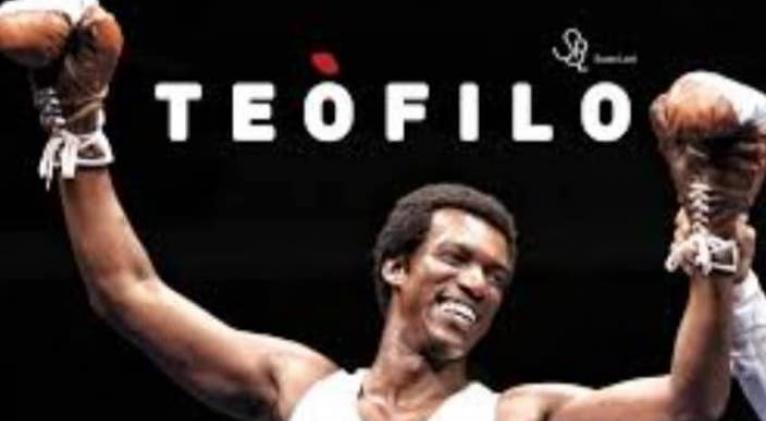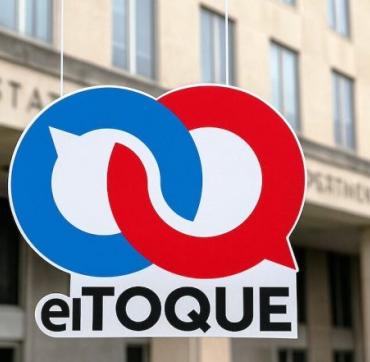Alejandro Philips, Beyond Teófilo
especiales

Alejandro Philips recently finished filming Teófilo, a biographical film in which he embodies the Cuban boxing legend, a role that tested not only his talent but also his perseverance and ability to face great challenges. After such an intense season, what's occupying this young actor?
"I'm taking a break and spending time with my family; with my son, who's little and needs me; with my mom and myself; to spend a little time in peace and in the warmth of home."
But that doesn't mean he's totally—let's say—out of the spotlight. In fact, he recently performed at the Karl Marx Theater as part of a show that the Centro Promotor del Humor called "Ecos del Aquelarre":

"Of course, I'm continuing with my standard comedy. I was performing at the Aquelarre Festival, the National Humor Festival. In September, I'll be joining my group Teatro El Público, with Carlos Díaz, which will resume its Yarini season in September. I'm also in the Kilómetro Cero group."
It's precisely about humor that's worth talking about, because anyone who sees Teófilo carrying all his dramatic power might not imagine him making people laugh:
"I'm a trained actor, and during the pandemic, I saw a show Kike Quiñones hosted called El humor se piensa (Humor is Thought). I saw it one day by chance and then started following it. I found the whole world behind humor very interesting, the whole theoretical aspect, and what humor could become." That awakened a calling in me that I think had always been there, but that program, in particular, made me think it could also be a path to follow.
"Then I arrived in Havana, saw Kike, and told him I wanted to get into comedy. He asked me if I'd had any experience, and I said no, and then I started writing my own stuff, doing a little more research, studying, and understanding humor, which is a whole world, and I always say that everything you're going to do, the first thing you have to do is understand it. I was very lucky because I first started in a peña, where I took off, or where I found a path that interested me even more in stand-up comedy, and it was there that I began doing it under the guidance of Michel Pentón, a very wise guy when it came to stand-up comedy.
"We stayed for a year doing the sessions at the Bertolt Brecht, and that gave me the opportunity, along with a group of young people, to test out materials and write our own stuff. We had a kind of workshop with our own materials. And there we each built our own style, our own way of working, and, above all, based on what each of us wanted to say, what interested us.
"Marco García also helped us, who came to teach a workshop as well; Doime... Well, I received support from several artists. But basically it was there, at the Brecht, with Michel Capitán Diez... a group of young people who started doing it, especially championing stand-up comedy. I started there and fell in love with humor."
Falling in love can be surprising, but if you look closely, it's almost never so coincidental or inexplicable. What were the charms of humor that captivated Alejandro Philips?
"I always say that what you experience doing stand-up comedy is incredible: it's just you in front of an audience; it's an extraordinary experience that I love. And the exercise of writing, of crafting a joke, nobody knows everything that's behind a joke that works and has a certain elaboration. Besides, I think it's also a very rewarding art form; in a way, it guarantees you an audience, from the perspective that we need to laugh. I also see it as a way to have fun. I have a lot of fun making other people laugh and enjoy. I think that, if life allows it, I'll always make room in my career for comedy.
But my true passion, or at least the primal passion of all actors, is on the stage: "Theater is my great vocation. Theater is the mother of acting. I believe it's fundamental. Theater is where you can truly put everything you learn, and it's the most reliable experience you can have, from an acting perspective. It's the background, the training, to be able to face other media."
Regarding his experiences in this theatrical manifestation, he commented: "When I arrived in Havana, the first group I was in was Teatro La Luna. Raúl Martín was the one who welcomed me here. Unfortunately, we weren't able to schedule any premieres, but I worked with him for a short time. During your student life, you do a lot of things, but I always had a dream: to work with Carlos Díaz at Teatro El Público. And well, in Carlos Díaz's last premiere, at Yarini, I had the chance to play the character, Bebo La Reposa, and I really enjoyed it. It's an experience I'm grateful for and think is fabulous. I also worked with Kilómetro Cero, with Lili Lam, on that spectacular play Kilómetro Cero. I had the chance to go to the Gibara Festival with them and play the character of Leo, which I also found to be a very interesting experience.
Is television somewhere on Philips' agenda? Immediate response: "Yes, I'd like to do television. Television is the media of the people; it's popular. And yeah, I’d like to, but well, the proposals I received back then, I couldn't accept them because of the film, and for now, I haven't received another one, but of course. I think I'd even like to try radio. I really like radio and I'd also like to experiment a bit in that media, which is kind of a classic."
He is, of course, still enjoying the process of Teófilo, but aware that "an actor's career is like this: you finish one character and then we'll see what the next one has in store for you, because it's going to be a completely different and equally enriching journey.
"People often ask me: but how do you do comedy, do this, and do theater? And I always use the analogy of a musician. With a violin, you can play in a symphony orchestra, in Van Van, or even make alternative music. We actors also have an instrument: our voice, our body, our psyche, and you fine-tune it and adjust it to the style you're defending, to the genre. That's the richness of this profession, and as long as you can, you have to be brave and try. Enjoying the process is always the most important thing and what you're most grateful for."
Translated by Amilkal Labañino / CubaSí Translation Staff














Add new comment